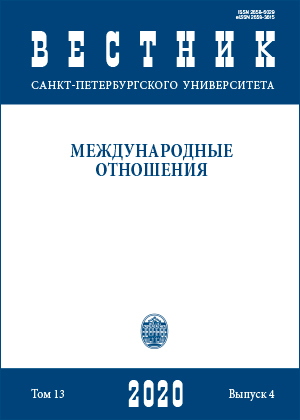New nationalism and the struggle for domination in the global digital cultural space
DOI:
https://doi.org/10.21638/spbu06.2020.404Abstract
The article is devoted to one of the paradoxes of the modern system of international relations: the desire of many countries to restore their political and economic sovereignty, combined with the rapid development of digital technologies and the formation of an increasingly homogeneous global cultural space. The phenomenon of “new nationalism” arose in connection with the obvious crisis of globalization led by the United States. At the same time, this “new nationalism” is fundamentally different from the classical models of the 19th and 20th centuries. In particular, clearly visible is its weak connection with the ideas of a national cultural revival and the sphere of culture in general. The digital revolution that humankind is going through today creates favorable conditions for the “restart” of globalization. The locomotive of integration processes in the new conditions is mass culture — in the form of new consumption technologies and everyday practices. A global digital civilization is gradually taking shape. The struggle for economic influence and political dominance, particularly between states such as the United States and China, is complemented by the opposition of “Westernization” and “Easternization” as the leading trends in contemporary global culture. The arguments presented in the article allow us to make the following assumption: in several decades, China, the United States and other countries will occupy a place in the world political, economic and cultural hierarchy that is comparable not with the level of their sovereignty and national identity, but with the scale and quality of their participation in the global exchange of goods, ideas and cultural meanings.
Keywords:
digitalization of international relations, globalization, new nationalism, US-China relations, global digital civilization
Downloads
References
Globalization is waning, and a US-China trade deal won’t solve that, strategist says (2019), CNBC, April 30. Available at: https://www.cnbc.com/2019/04/30/david-roche-globalization-waning-no-matter-uschina-trade-deal.html (accessed: 12.08.2020).
Menasse, R. (2019), As Nationalism Rises, Europe Dies, The New York Times, October 8. Available at: https://www.nytimes.com/2019/10/08/opinion/nationalism-rise-europe.html (accessed: 12.08.2020).
Brake, D. (2018), Economic Competitiveness and National Security Dynamics in the Race for 5G between the United States and China, TPRC 46: The 46th Research Conference on Communication, Information and Internet Policy. Available at: https://ssrn.com/abstract=3142229 (accessed: 12.08.2020).
The Cultural Borders of Songs. Available at: https://pudding.cool/2018/01/music-map (accessed: 12.08.2020).
Rachman, G. (2016), Easternisation: War and Peace in the Asian Century. London: Bodley Head.
Friedberg, A. (2018), Globalisation and Chinese Grand Strategy, Survival, vol. 60, iss. 1, pp. 7–40. Available at: https://iiss.tandfonline.com/doi/full/10.1080/00396338.2018.1427362 (accessed: 12.08.2020).
Areddy, J. (2020), China’s Xi Faces New Limits, at Home and Abroad, The Wall Street Journal, January 20. Available at: https://www.wsj.com/articles/chinas-xi-faces-new-limits-at-home-and-abroad-11579474468 (accessed: 12.08.2020).
Tsvetkov, I.A. (2019), US–China rivalry as a factor of the contemporary US–Russia Relations, Vestnik Sankt-Peterburgskogo universiteta. Seriia Mezhdunarodnye otnosheniia, vol. 12, iss. 4, pp. 406–421. https:// doi.org/10.21638/11701/spbu06.2019.401. (In Russian)
National Security Strategy of the United States of America, December 2017. Available at: https://www. whitehouse.gov/wp-content/uploads/2017/12/NSS-Final-12-18-2017-0905.pdf (accessed: 12.08.2020).
Orinx, K. (2019), A Chinese Fox against an American Hedgehog in Cyberspace? English Military Review, September-October. Available at: https://dial.uclouvain.be/pr/boreal/object/boreal%3A219034/datastream/PDF_01/view (accessed: 12.08.2020).
Downloads
Published
How to Cite
Issue
Section
License
Articles of "Vestnik of Saint Petersburg University. International relations" are open access distributed under the terms of the License Agreement with Saint Petersburg State University, which permits to the authors unrestricted distribution and self-archiving free of charge.




